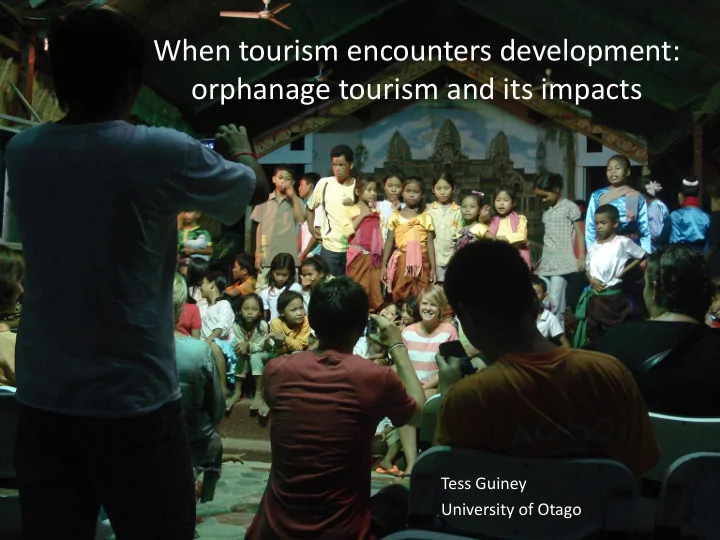

When tourism encounters development: orphanage tourism and its impacts Tess Guiney University of Otago
Orphanage Tourism • Visiting, attending cultural performances or volunteering at orphanages overseas
Fieldwork • Semi-structured interviews and focus groups • 85 key informants: • 37 orphanages/NGOs working with orphans • 46 orphanage directors or staff • 32 orphanage volunteers • 7 representatives from 3 NGOs working against orphanage tourism
Cambodian Orphanages • At least 269 • 21 state run • 75% increase in five years to 2010; 75% increase in tourism Number of Residential Care Facilities in Cambodia 300 250 200 150 269 257 225 100 196 182 154 50 0 2005 2006 2007 2008 2009 2010 • Inconsistencies with registration • Orphanage tourism is significant in Cambodia
The Irony of Orphanages Attitudes of tourists: what do tourists think is the best solution for the child if s/he has no parent(s)? 70% 60% 50% 40% 65% 30% 20% 10% 18% 16% 0% 1% Live in an orphanage Live with a relative Live with a different Other family in the community • Yet almost all orphanages are foreign funded – 91.8 per cent answered yes, maybe or already had when asked if would donate money to an orphanage (UNICEF, 2011) • Therefore why is there so much support for orphanages?
Perception of Cambodia • The Khmer Rouge • Corruption • Poverty Lonely Planet Cambodia (2010): “despite this beautiful backdrop, life is no picnic for the average Cambodian. Cambodia remains one of the poorest countries in Asia and it’s a tough existence for much of the population” • “the shuttling from a tourist subjectivity to that of a humanitarian actor is common among travellers in Cambodia, and is often associated with the imagery of Cambodia as an impoverished place” (Hughes, 2008)
Poor, Brown Children • Poverty porn • Children most common images • “’Victim’ images appear destined to arouse the emotions of viewers. Children in particular raise strong feelings when they’re portrayed as especially vulnerable and weak (at the moment of death, for example, or having been orphaned)...They may also consciously elicit the sympathy, pity and compassion of viewers, in the belief that emotional responses attract attention to stories or stimulate charitable giving” (Campbell, 2005) • Adults erased/visualised as incapable – western need to intervene • Colonial roots – white man’s burden
Flipping Orphanage Tourism • Poverty tourism: “voyeuristic tourism, where rich foreigners come and gape at the lives of impoverished inhabitants of developing countries” Gentleman (2006) • “So one of the arguments we often give is would you allow this to happen in your own country? Or would you allow a foreigner to go in the child’s bedroom or to watch your child while eating his dinner?” (KI 7: NGO Representative, Phnom Penh) • Similarly, would you allow foreigners to disrupt children’s classes? Enter their homes? Take children away for excursions? KI 14: Responsible tourism organisation Siem Reap • Responses are overwhelmingly NO!
Impacts: Positives • Financial support – 100% foreign funded (UNICEF, 2011) • Educational opportunities – is it supporting an under-resourced social service sector in Cambodia? • Improve cross-cultural understanding? • Increase awareness about Cambodia/orphans in Cambodia? • Improve staff capacity as some places use skilled volunteers to train staff • Provide love • Obvious benefits for the tourist – great experience, CV etc.
Impacts: Negatives • Attachment issues – bonds with volunteers ‘ Zooification ’ – “I think some kids in orphanages are used to being…as parading them as the dolphin show or orphanages” • Internalisation of difference/inferiority • Keeping children in poverty – perception of struggling = more donations • Orphanage business • Corruption • Child exploitation “what are the ethics of having kids out there at 10 o’clock at night dancing and inviting you to come and visit their orphanage? How is that any different to them being out there at 10 o’clock at night asking for a dollar from a tourist? And how is it any safer?” (KI 3 ) • Unsustainability
Negatives Continued… • Inadequate child protection policies in many orphanages • No background checks in most places • Paedophilia linked to some orphanages – is far easier to access children in orphanages than general public • Abuse • Neglect
Complications • Cannot simply be halted completely • Family contact has often been lost • Often no reintegration policies • Children could end up in worse situations if orphanages lost funding and were closed • Regulations to minimise impacts are key • Many have formulated their own restrictions on tourism
Recommend
More recommend